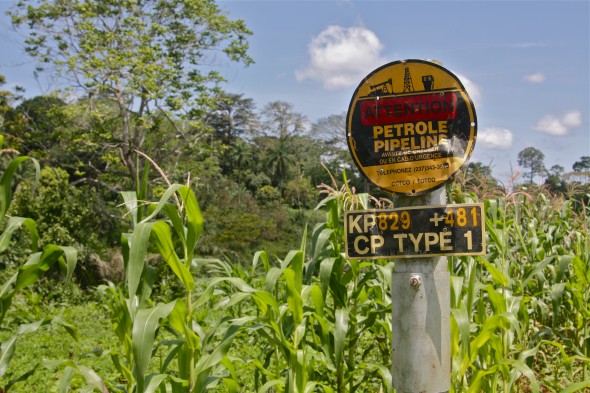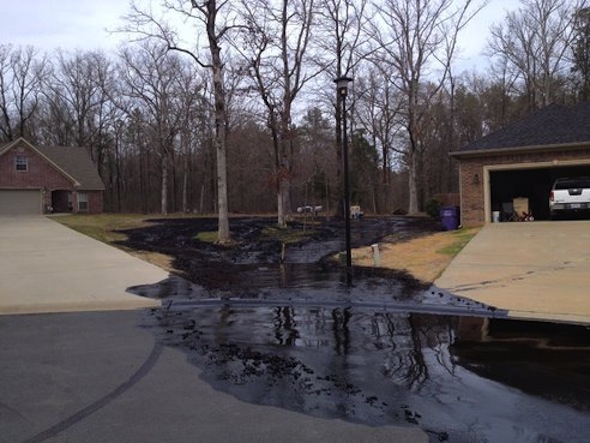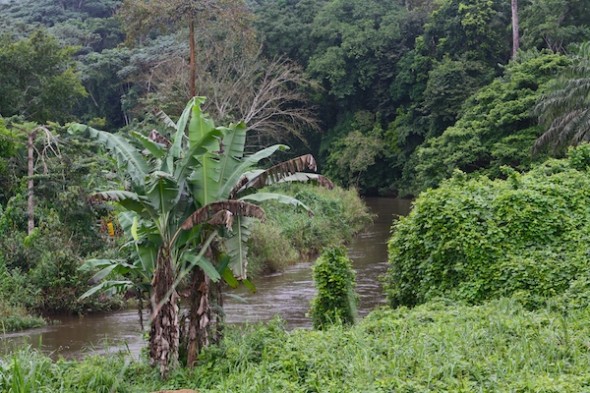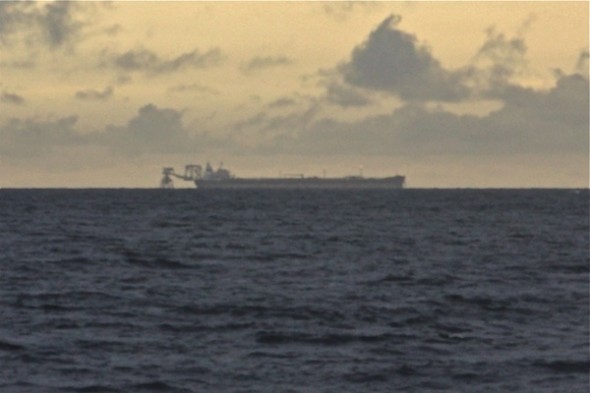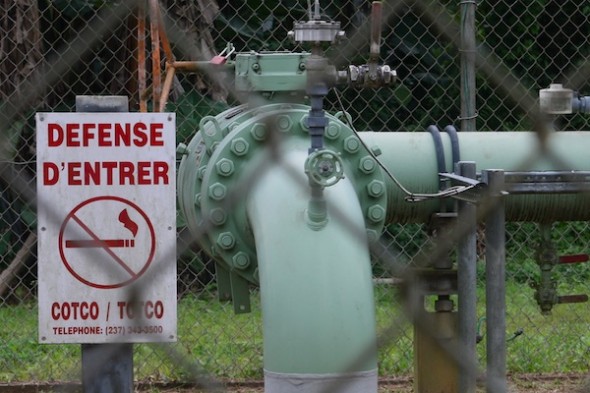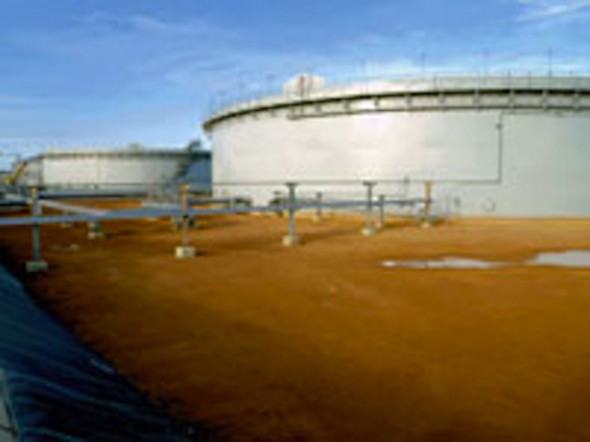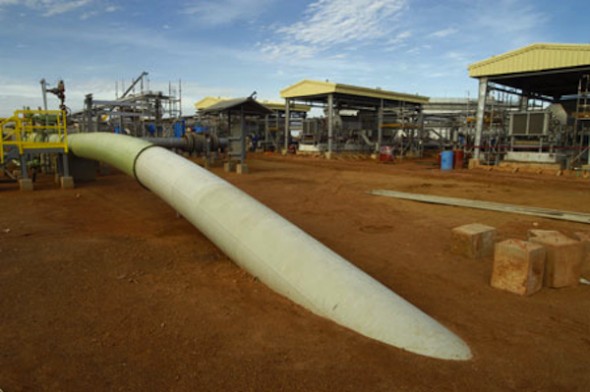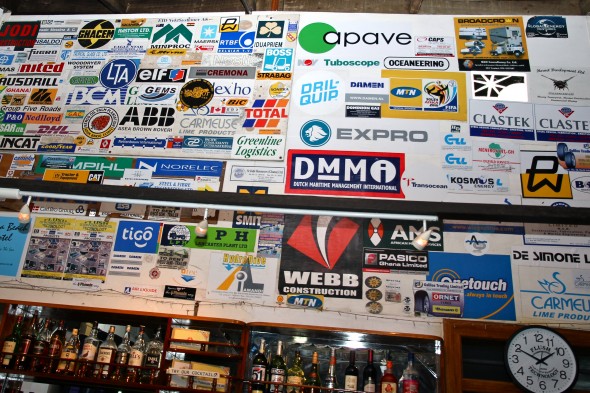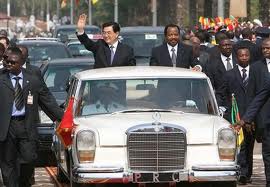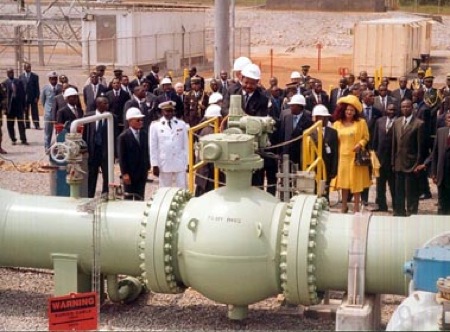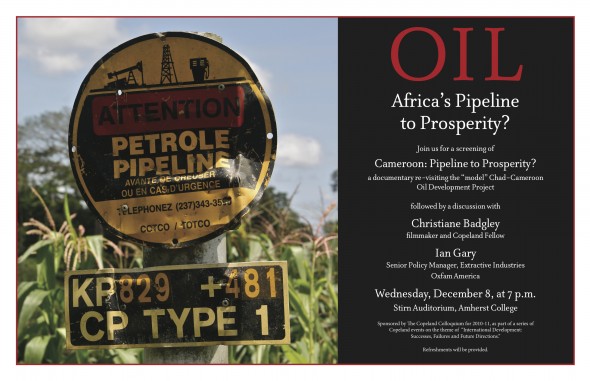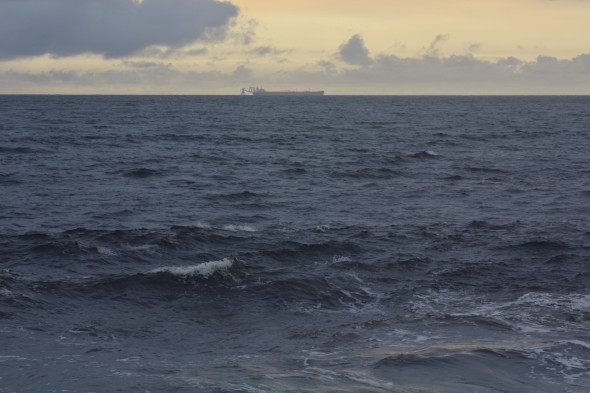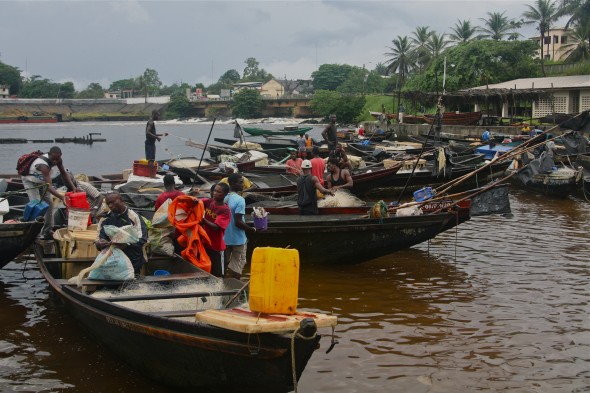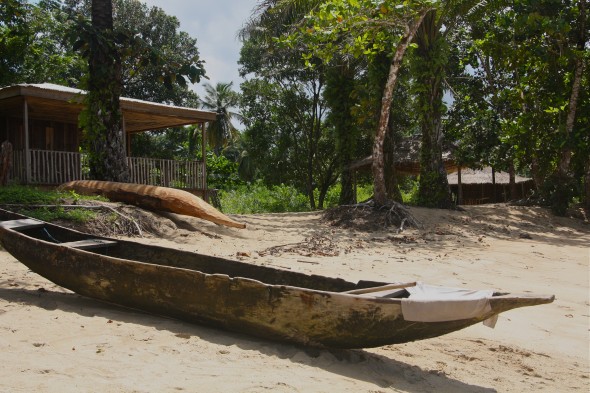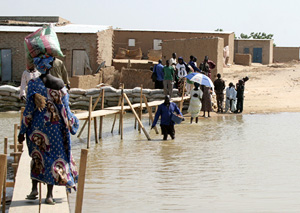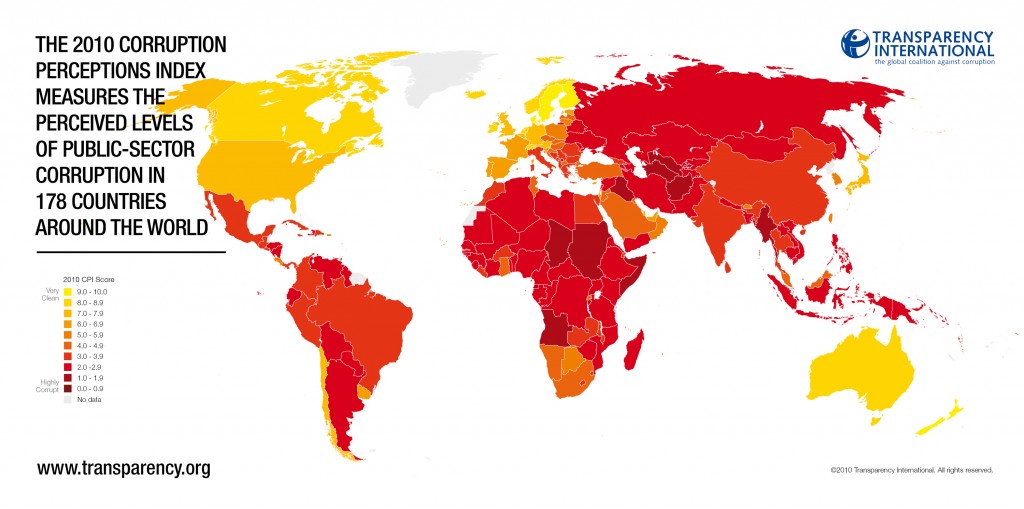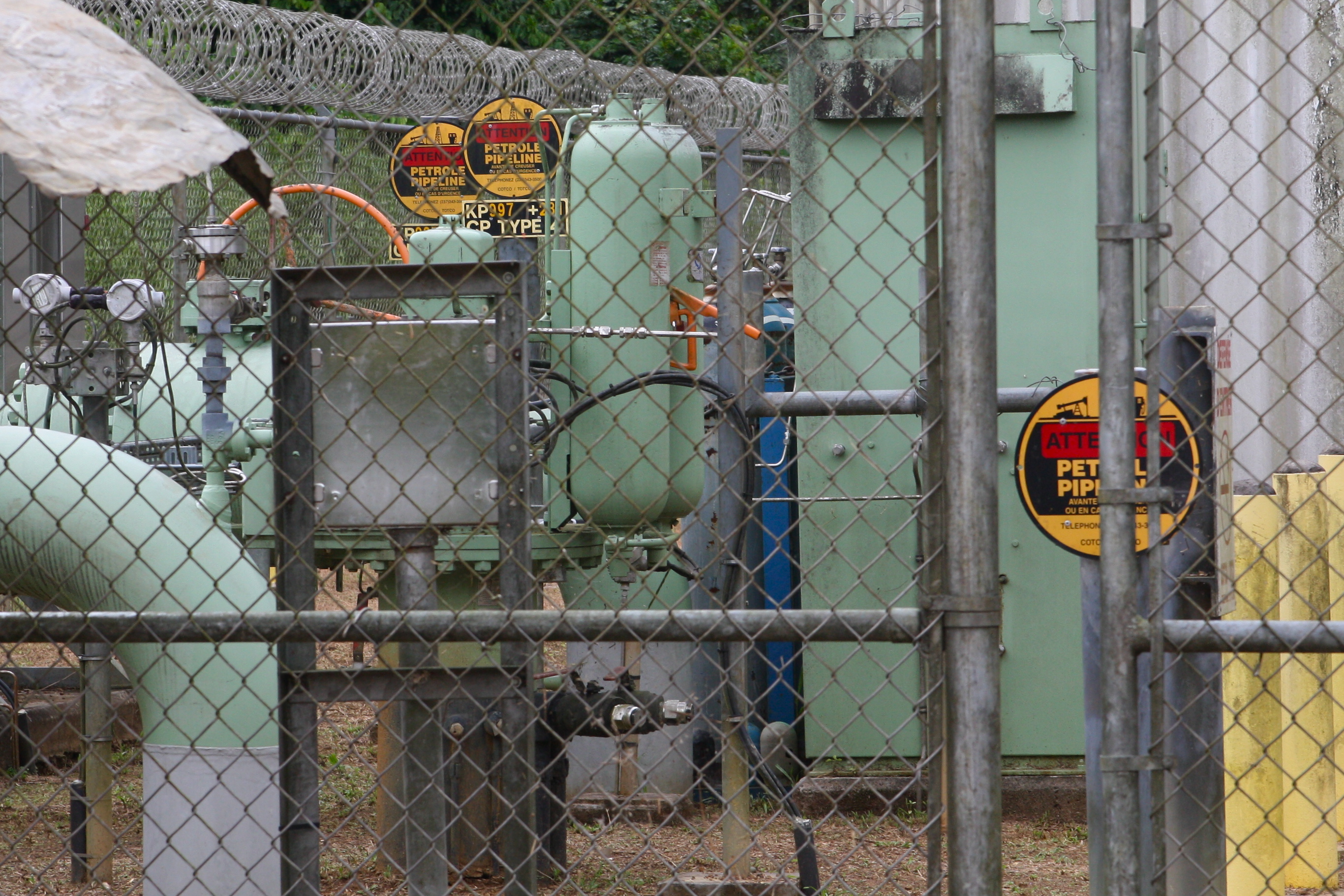Better late than never: Cameroon renegotiates pipeline transit fees
After ten years of operations, Cameroon has finally managed to renegotiate the paltry transit fees it collects on the Chad-Cameroon pipeline.
Cameroon will now receive 618.02 CFA francs ($1.30) per barrel of oil, up from 194.91 CFA francs. Since 2003 Cameroon was collecting less than U.S. 45 cents per barrel, a rate that was not linked to inflation or to the price of oil. Nor was the rate subject to regular review. Even the current rate, $1.30 per barrel, is low, but it will at least be raised every five years based on the rate of inflation.
The quantity of oil coming down the pipeline will soon increase as Niger has signed an agreement to use the pipeline. China National Petroleum Corporation (CNPC), the operator in Niger, will also use the pipeline for its Chadian operations. Exxon Mobil has not disclosed how much CNPC will pay to use the pipeline.
Read more:
Pipeline Tchad-Cameroun: Le droit de passage passe de 194 FCFA à 618 FCFA par baril
Niger awards second oil permit to CNPC, plans exports
Chad’s oil: 10 year anniversary, nothing much to celebrate
It was on October 10th 2003 that Exxon Mobil and its partners officially inaugurated the Chad-Cameroon Oil Project. The press release marking the event was positively jubilant:
Addressing inauguration attendees, Morris Foster, president of ExxonMobil Development Company, said, “It is with great pride that I am here today to celebrate this tremendous accomplishment with everyone who has been involved in the Project. I want to personally thank President Deby and President Biya for their support along with important contributions of our co-venturers, Petronas and ChevronTexaco, and the World Bank Group for their commitment to this Project.
“Today we celebrate not only what was achieved during the construction but Esso, as operator, also celebrates the manner in which it has been accomplished,” Mr. Foster added. “We maintained our long-term focus on this project over 27 years of effort and changes in the consortium, increased the known oil reserves to commercial levels and helped turn a vision in 1976 into a reality. We believe this project will help prepare a brighter future for the citizens of Chad and Cameroon, and I am proud we are part of it.”
Another Exxon Mobil pipeline ruptures
Exxon Mobil pipeline problems are back in the news and this time it’s in Arkansas.
From InsideClimate News: A pipeline that ruptured and leaked at least 80,000 gallons of oil into central Arkansas on Friday was transporting a heavy form of crude from the Canadian tar sands region, ExxonMobil told InsideClimate News.
Local police said the line gushed oil for 45 minutes before being stopped, according to media reports.
Crude oil ran through a subdivision of Mayflower, Ark., about 20 miles north of Little Rock. Twenty-two homes were evacuated, but no one was hospitalized, Exxon spokesman Charlie Engelmann said on Saturday.
In an interview with InsideClimate News, Faulkner County Judge Allen Dodson said emergency crews prevented the oil from entering waterways. The judge issued an emergency declaration following the spill and is involved in coordinating clean-up efforts among federal, state and local agencies and Exxon.
Exxon fails to address pipeline safety risks, fined $1.7 million
“The U.S. Department of Transportation on Monday hit Exxon Mobil Corp. with a $1.7 million fine over a July 2011 pipeline failure that dumped more than 60,000 gallons of oil into Montana’s Yellowstone River after concluding the oil giant failed to effectively address pipeline safety risks,” writes Sean McLernon in the March 26th edition of Law360.
According to a news release from the Department of Transportation’s Pipeline and Hazardous Materials Safety Administration (PHMSA), “ExxonMobil failed to properly address known seasonal flooding risks to the safety of its pipeline system, including excessive river scour and erosion, and to implement measures that would have mitigated a spill into a waterway.”
I wrote about the Yellowstone River spill in September 2011 asking what lessons the Montana accident might have for Cameroon. To recap what I said then, environmentalists in Cameroon and Chad have long been concerned about the safety of the 1070 km Chad-Cameroon oil pipeline and have stated repeatedly that COTCO (Exxon Mobil pipeline operations in Cameroon) has not provided reliable information about its real capacity to respond in the event of an oil spill. Much of the pipeline crosses relatively remote and hard-to-access areas (few or no roads) and many question COTCO’s assertions that response teams could quickly travel to the scene of any incident.
Resentment grows in Chad after 26 soldiers die in Mali
While debate continues in the Western press over Idriss Deby Itno’s claim that Abou Zeid and Mokhtar Belmokhtar are dead, news from Chad suggests there’s little support for Deby’s decision to send Chadian soldiers to Mali. Al Jazeera reports that, “Many in Chad are sceptical of Mali offensive.”
La Nouvelle Expression in Cameroon writes that Deby’s military move is an attempt by an old putchist to improve his image. Deby’s country is paying a heavy price, La Nouvelle Expression writes, but Deby accepts it courageously. For Chadian blogger Makaila the losers in Mali are the people of Chad. “Que toute l’opposition tchadienne se taise car désormais, Hollande, Obama et les autres, ne jureront que par (Deby).” (The Chadian opposition should shut up because from now on Hollande, Obama and the others will only swear by Deby.)
How many more jihadists and Chadian fighters need to die before all of Deby’s past sins are forgiven?
Cameroon hires company for oil spill clean-up, nine years behind schedule
You learn all kinds of crazy things reading the news. Cameroon Online published a story from APA news on August 19th, Une firme francaise va faire de la depollution maritime au Cameroun.
According to the story, Cameroon’s Societe Nationale des Hydrocarbures (SNH, the state oil company) has signed an agreement with French company, Le Floch Dépollution, for maritime oil spill clean-up operations.
Better late than never.
Pipeline news
Although the work I’m doing now in Cameroon is not directly related to the Chad-Cameroon pipeline, I’m getting updates on the pipeline as possible.
Last week I had a meeting at the Ministry of the Environment and Conservation and learned that Cameroon is once again trying to renegotiate the transit fees it receives for pipeline use. Although most of the pipeline is in Cameroon, which means that most of the environmental risk is in Cameroon, the country benefits only minimally from the operation. Most of Cameroon’s revenues from the project come in the form of transit fees collected on the oil pumped through the pipeline. Even at the time of signing, the rate (41 cents per barrel) was low and to add insult to injury, the transit fee isn’t indexed to inflation or to the cost of oil.
In the nine years that the pipeline has been operational, Cameroon has watched the price of oil skyrocket while its meager transit fees have remained unchanged. (See my December 2010 post on the lack of transparency surrounding Cameroon’s earnings from the pipeline.)
ExxonMobil’s dark empire
Steve Coll’s new book, Private Empire: ExxonMobil and American Power, is out and Democracy Now! has an extensive interview with him about Exxon’s dirty dealings from Indonesia to Nigeria and Chad.
Here’s an excerpt from the interview about ExxonMobil’s involvement in Chad:
Chad, of course, is a benighted country—today about 181st out of 187 countries in the human development index kept by the United Nations indicating quality of life. Life expectancy there is still below 50 years. But it has oil. And its authoritarian leader, to put it politely, Idriss Déby, decided to try to develop this oil, even though Chad was landlocked and didn’t have any national capacity to build an oil company, so they invited in Exxon and the World Bank. And they undertook this experiment, really without precedent, to require Chad to use its oil profits for the good of its people, spending on education, health and social development. And Exxon was a participant in this and described it as potentially a new model to address the resource curse in Africa, where countries that are rich in minerals but try to develop through the sale of those minerals often fail to serve their people very well. So this was a kind of a grand experiment. And it failed.
Chad: Oil money, hungry people
Today Chad is facing a food crisis. An alarming number of people are hungry and sick in the northern part of the country.
The Guardian ran a story recently on the dire situation, Chad’s malnourished children offer stark illustration of Sahel food crisis.
Strangely, the article doesn’t mention the fact that Chad is an oil producing nation with sizeable oil revenues.
Chad earned more than US$2 billion in 2011 from the ExxonMobil Doba fields project. As I’ve reported, by 2008 Chad had already earned more than US$8 billion from the Chad-Cameroon oil development project. China is also drilling and refining oil in Chad. I don’t have figures for Chad’s earnings from Chinese drilling, and the Chinese-built and 60% owned refinery has been mired in conflict since it opened in June 2011. But the point remains: Chad has oil revenues, but apparently there’s not enough money to deal with the food crisis.
Pipeline oversight: Are independent monitoring panels effective, truly independent?
Over the past few weeks I’ve been scrutinizing documents on the safety and oversight of the Chad-Cameroon pipeline. As I wrote in an initial blog post, the ruptured ExxonMobil pipeline and subsequent oil spill in the Yellowstone River in Montana got me thinking about similarities with the ExxonMobil pipeline that crosses no fewer than 17 major rivers in Cameroon. I then wrote a follow-up post on pipeline oversight (or lack of).
So I was thrilled when I found out that Oxfam America was preparing a new report on the monitoring of controversial oil and gas projects featuring the Chad-Cameroon pipeline as one of its case studies. The report, Watching the Watchdogs, was launched yesterday in Washington, D.C. Among the speakers at yesterday’s panel were Jacques Gérin and Nadji Nelambaye who were both involved with monitoring the Chad-Cameroon pipeline.
Pipelines: More on the Montana – Cameroon connection
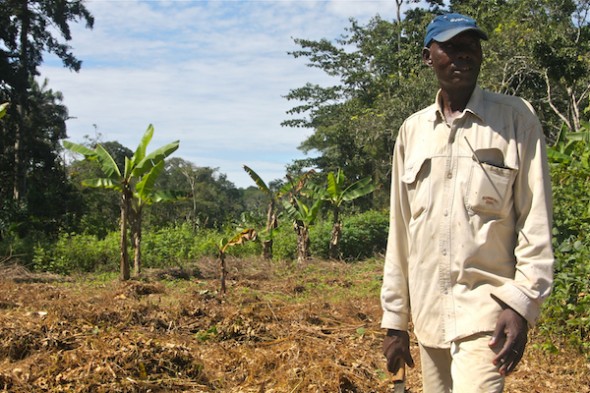
Farmer Jean Edzoa standing on the pipeline easement near Yaounde. He and other farmers in the area complain that "nothing grows" around the pipeline. Photo by Christiane Badgley
I recently wrote about ExxonMobil’s July oil spill in Montana and what lessons the Yellowstone River accident may have for Cameroon.
The same day an article in The New York Times, Pipeline Spills Put Safeguards Under Scrutiny, analyzed the regulation and oversight of the 167,000-mile system of hazardous liquid pipelines crisscrossing the United States.
The article describes a federal monitoring agency that is, “chronically short of inspectors and lacks the resources needed to hire more, leaving too much of the regulatory control in the hands of pipeline operators themselves…”
Exxon spill in Montana: lessons for Cameroon?
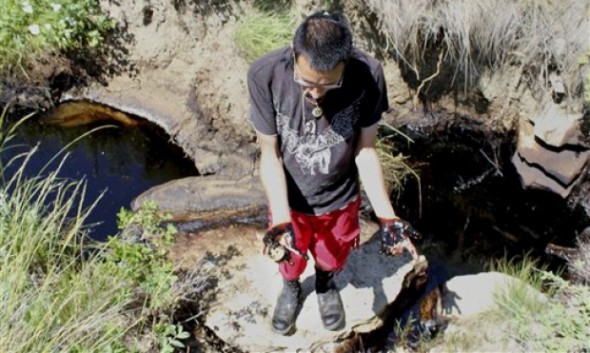
A member of the Blackfeet Tribe takes 'water' samples for a community hospital water lab near Cut Bank Creek, Mont. Photo: Destini Vaile/AP
On July 1 an ExxonMobil underground pipeline ruptured near Laurel, Montana, spilling tens of thousands of gallons of crude oil into the Yellowstone River. Montana is a long way from Africa, but this spill has me thinking about the Chad-Cameroon oil pipeline, another ExxonMobil underground pipeline that passes below several rivers where water pressure and erosion are real concerns.
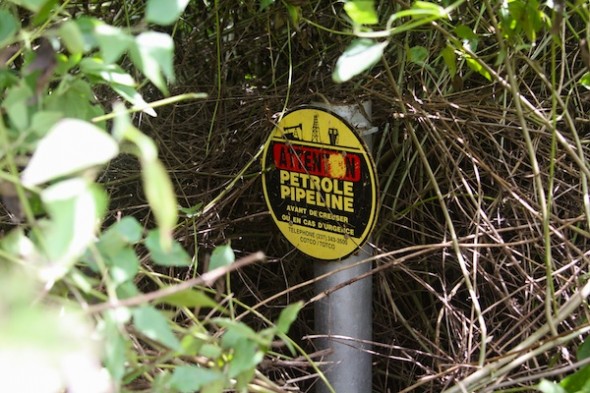
The 30 meter wide pipeline easement is supposed to be kept cleared at all times. This pipeline marker was buried under thick brush in clear violation of safety regulations. Photo by Christiane Badgley
Environmentalists in Cameroon and Chad have long been concerned about the safety of the 1070 km Chad-Cameroon oil pipeline and have stated repeatedly that COTCO (ExxonMobil pipeline operations in Cameroon) has not provided reliable information about its real capacity to respond in the event of an oil spill. Much of the pipeline crosses relatively remote and hard-to-access areas (few or no roads) and many question COTCO’s assertions that response teams could quickly travel to the scene of any incident.
It’s been awhile…
Days turn into weeks and I haven’t posted a thing. I guess I’ve got those oil blues…
Well, that and I have been editing video and preparing an article for publication. If all goes as planned, new material should be online in the next few days. I’ve also been to London to interview Stuart Wheaton, Ghana Development Manager for Tullow Oil, and Romain Chancerel, Project Manager for the Global Initiative for West and Central Africa (GIWACAF). GIWACAF is a public-private partnership working to develop and enhance oil spill response capacity in the Gulf of Guinea region.
Will the Chinese use the Chad-Cameroon pipeline?
I just stumbled across an interesting bit of news. China and ExxonMobil may do business together in Chad. I said, “may,” not “will,” but this could be a significant development.
It is fascinating the way information about the Chad-Cameroon pipeline is revealed. It’s really difficult to get interviews with government or oil company officials. I’ve tried off and on for months, to no avail. So for some information I watch what comes through the (state-run) press. Nothing is straightforward. Items often appear about events that occurred months earlier, for seemingly no reason, but sometimes interesting little nuggets of information are mentioned in passing.
If you’re not paying attention, they are easily overlooked. For example, a few days ago, the Cameroon Tribune (government publication) ran an article about the pipeline with the headline, “36.75 million barrels of oil and 7.6 billion Francs” (That’s about US$ 17 million.)
The article, basically highlights from the October 2010 Pipeline Steering and Monitoring Committee report, began with details on the quantity of oil that had transited across Cameroon during the first ten months of 2010, along with information on the transit fees. Apparently less oil was pumped in 2010 than in 2009. Okay. Chances are if you weren’t following the pipeline story you wouldn’t even read beyond the headline.
Yet, several paragraphs down, the article contained some intriguing information.
A few end-of-the-year thoughts
Another year comes to an end, and along the Chad-Cameroon oil pipeline not much has changed. Well there are new mosquito nets, but besides that you will be hard-pressed to find any positive developments for local populations.
The government of Chad continues to collect oil revenues, but apparently is unable to use them to benefit Chadians. Of course the time for believing that the country’s oil wealth would be put to good use is long gone, but it would still be nice to be surprised. With both parliamentary and presidential elections scheduled in 2011, perhaps Deby will decide to put some of the country’s oil money (approximately US$ 5.7 billion earned from project start to July 2010) towards development.
More likely, however, Chad’s oil money will continue financing arms and the military. Deby increased military spending by an astonishing 663 percent between 2000 and 2009, made possible, of course, by oil. And with new Exxon drilling, as well as the Chinese oil projects in the country, there will be plenty of oil money for the foreseeable future.
In Cameroon no one expected the pipeline to bring much wealth to the country (pipeline earnings account for somewhere between 2 and 4% of the Cameroonian budget), and it is unlikely that anyone was waiting for oil money to be spent responsibly. But people hoped, and were assured by the project partners, that the pipeline would not make things worse. Unfortunately, for too many people living along the pipeline, life is harder today than it was before oil arrived.
But there is some encouraging news: the U.S. legislation passed this summer requiring S.E.C. registered extractive industries companies to disclose all payments to governments is an important step towards increased transparency. Transparency is not an end in itself, but is part of an equation that will hold governments accountable and increase the chances that resource revenues are spent wisely. As I said, Chad has elections in 2011 and so does Cameroon (a presidential election in October). Neither Chad nor Cameroon are known for being democratic and there’s no reason to be overly optimistic. However, it’s an interesting moment in the history of “françafrique” and the ongoing electoral crisis in Ivory Coast may very well have implications throughout the region.
Pipeline: Cameroon earns 277.6 million U.S. dollars in seven years
I came across an interesting article that appeared in the Cameroonian daily, Mutations, on December 28th. At a ceremony launching a COTCO-sponsored mosquito net distribution campaign, Guillame Kwelle, the COTCO public and governmental affairs manager, announced that Cameroon had earned nearly US$ 278 million from the pipeline.
Really?
There has been little financial information made available by the Cameroonian government since the pipeline became operational and critics of the project have often pointed to the total lack of transparency regarding Cameroon’s earnings. How much money does the pipeline actually bring in and where does it go? The earnings from the pipeline are part of Cameroon’s petroleum revenues, but there is no data available that would allow people to see what percentage of those revenues comes from the pipeline — as opposed to other oil operations — nor is there any way to know how those revenues are spent. Even if the transit fees are fairly easy to calculate (a fixed, per barrel fee), all the other assorted taxes and fees are harder to estimate. So, this announcement at a COTCO public relations event is newsworthy.
OIL: Africa’s pipeline to prosperity?
Ian Gary, Senior Policy Manager for Extractive Industries at Oxfam America, joined me at Amherst College on December 8th for a screening and discussion on Africa’s oil challenges. Gary, who co-authored, Chad’s Oil: Miracle or Mirage? in 2005, reminded us that Africa’s oil boom will provide more that $400 billion to African governments through 2019. By 2015 the U.S. will get 25% of its imported oil from Africa.
Chad’s oil, to the surprise of no-one really, has hardly worked miracles. The country is no better off than it was before oil production began. Most economic indicators are down. The people in the oil-producing region are much worse off than they were before the oil boom. Farmers for the most part, many in the Doba Basin area are no longer able to access their lands, now dotted with drill pads and crossed by pipes and high tension cables. In 2010, the World Bank admitted that “in reality, close to 50 percent of expenditures has gone to the military.”
Chad, once the “model” for oil development (although one can argue that Chad was only a “model” until oil began to flow), has now joined the ranks of examples to avoid. The resource curse strikes again. Ghana is next, with its first oil shipping on December 15th. Will Ghana go the way of Chad or will the country get it right this time? Although the Ghanaian government has made pledges and promises, recent news suggests that there is some cause for concern (read a few of the latest articles posted on Ghana Oil Watch to get a sense of the troubles on the horizon).
Deja vu all over again
In a few weeks Ghana’s first oil will ship and lately the news coming from Accra has been less than encouraging. There’s been a lot of talk the past few years about making oil revenues work for the Ghanaian people (with references to avoiding Chad’s problems), but now that the country is moving from talk to action there’s cause for concern.
Kribi: Major industrial developments on the horizon
Take a nice look at Kribi’s quaint fishing port. It may be unrecognizable in a few years.
After many years of talks and delays, the Cameroonian government appears to be moving ahead with the Kribi deepwater port project, the first step of a major industrial development program.
A recent dispatch from Chinese state radio announced that the Cameroonian government will soon begin a US$50 million compensation program for residents on the site of the future port. According to the article, “The Kribi deep water port in southern Cameroon will be constructed on a 26,000 acres piece of land. It will have an industrial complex with four terminals as well as a mineral wharf for exporting iron. According to the construction timetable, the general excavation works are expected to begin in December.”
No details are provided on the nature of the compensation or the number of people who will be displaced by the project.
The port is not the only major development on the horizon. Work is already underway on Kribi’s gas thermal power plant, which is expected to become operational sometime in late 2012.
Is there a connection between the Chad-Cameroon oil pipeline and the proposed industrial development around Kribi? That depends how you define “connection.”
CHAD: Flood victims contend with thugs, cholera and hippos
Below is an article from IRIN (UN). The flooding in Chad and elsewhere in the region has been getting far too little coverage in the Western media. Many areas in Chad and beyond are experiencing a level of rainfall and flooding that hasn’t been seen for 50 years. Chad has suffered through several years of drought and although the rains may provide relief in some places, flooding is wreaking havoc in many parts of the country. Villages and farms have been destroyed; flooded fields are particularly worrisome in Chad where hunger is already a problem.
The tragic irony: All the oil money in the world can’t prevent torrential rain and flooding, and given the likelihood that the floods are related to global climate change, oil may be in part to blame for the situation. The question now, however, is whether the government of Chad has — or will — use its oil revenues to improve the country’s infrastructure. Improved sanitation, roads and the construction of canals and dykes are critical moving forward.
WALIA, 17 November 2010 (IRIN) – Scores of families recently displaced by flooding in the Chadian capital N’djamena face a daily struggle against local thugs, wild animals, a lack of toilets and night winds that knock down makeshift tents.
The Chad government announced in late October that it would relocate thousands of people hit by flooding when the River Chari burst its banks, but any such move will take time; in the meantime families whose homes crumbled are just getting by – new hardships adding to what were already tough living conditions in their neighbourhood of Walia.
“We are exposed to too many dangers here,” said Obed Langkal, seated with other residents of the tents and makeshift shelters set up on a stretch of land between a main road and the river. “We cannot rest comfortably at all.”
The recurring question
 Oil, an opportunity for economic development or a curse for African countries? That question is the subject of a recent radio panel on RFI (Radio France Internationale). It’s a two-part feature, in French. One of the invited guests, Gerard Magrin, is a Chad specialist who has written about southern Chad’s transition from cotton fields to oil fields.
Oil, an opportunity for economic development or a curse for African countries? That question is the subject of a recent radio panel on RFI (Radio France Internationale). It’s a two-part feature, in French. One of the invited guests, Gerard Magrin, is a Chad specialist who has written about southern Chad’s transition from cotton fields to oil fields.
You can listen to the discussion here:
Here’s a link to the second half of the discussion:
http://www.rfi.fr/emission/20101114-2-debat-le-petrole-opportunites-developpement-malediction-pays-africains
Speaking of farming, the subsistence farmers of Chad would have certainly benefited from an end to U.S. subsidies for American cotton farmers. Instead they got oil. That’s “development”. You can read more about how U.S. subsidies hurt African cotton growers in a recent Guardian article, “The Great Cotton Stitch-Up”.
Apathy is not an option
Here’s a post from the ONE BLOG about the International Anti-Corruption Conference getting under way in just a few days in Bangkok. This is a major gathering with more than 1500 people from 130 countries scheduled to attend. I’m thrilled that my short film, Cameroon: Pipeline to Prosperity? will be screening at the conference.
Nov 4th, 2010 4:37 PM EST
By Malaka Gharib
Next week, delegates from more than 130 countries will converge in Bangkok, Thailand to participate in the world’s largest anti-corruption meeting, the 14th annual International Anti-Corruption Conference (IACC).
According to Andrew Marshall’s Time Magazine article “How Corruption Is Holding Asia Back,” corruption is a problem that affects dozens of countries across the world — not just developing nations — and has been met with increasing apathy and acceptance from both world leaders and citizens.
What is most alarming, says Mr. Marshall, is that corruption creates an environment in which dishonesty can thrive even further. Last year’s Transparency International report said that the most common source of bribe demands is the police. And in sub-Saharan Africa, corruption is one of the region’s major barriers to ending extreme poverty. In fact, Africa loses around $148 billion each year as a result of corruption alone.
As you can see, “corruption is everyone’s problem — and apathy is no longer an option,” says Mr. Marshall.
We couldn’t agree more. It’s our duty as advocates to make sure that people know that corruption hurts — not helps — the fight against poverty. We’re curious to see what comes out of this year’s IACC meeting and hope that the delegation makes some headway in this growing issue.
Corruption Index
Transparency International has released its 2010 Corruptions Index. Chad ranks among the ten most corrupt countries in the world. Cameroon has made some progress — just a few years ago the country was at the bottom of the ratings — but is still mired in corruption.
Corruption was a problem in both Chad and Cameroon before Exxon began drilling. Organizations opposed to the World Bank’s involvement in the project warned that rampant corruption would certainly impact any poverty alleviation plans. They were right, but the World Bank knew this, too…which brings us back to the Bank’s crackdown on corruption. You can stop doing business with companies that bribe officials, but as long as those officials operate in a culture of impunity you’re not reducing corruption.
Definitions of corruption
Defining corruption is not as simple as one might think. The Asian Development Bank (ADB) website provides some interesting information on the definitions of corruption: “As a shorthand definition, ADB defines corruption as ‘the abuse of public or private office for personal gain.’ A more comprehensive definition is as follows: ‘Corruption involves behavior on the part of officials in the public and private sectors, in which they improperly and unlawfully enrich themselves and/or those close to them, or induce others to do so, by misusing the position in which they are placed.'”
I recently posted an article about anti-corruption efforts at the World Bank. I found the article interesting and the efforts of the Bank worth noting. However the fight against corruption has to go a lot further than crackdowns on bribery to be effective. If the Bank really wants to fight corruption, it has to work towards a cultural shift, supporting capacity-building measures that can help countries move away from a culture of impunity and towards the rule of law.
Worse, at times it appears that the Bank plays a double role: crackdowns on bribery and fraud on one hand, enabling projects that reinforce the status quo on the other.

